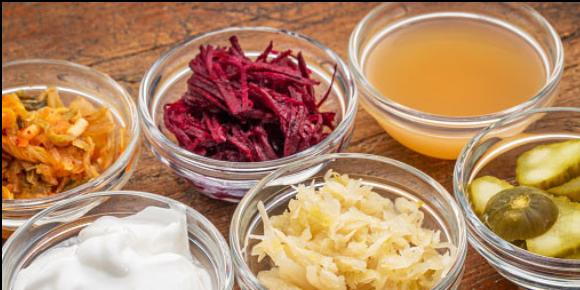How Fermented are you?

- posted: Jul. 23, 2022
Being from a high German heritage, I remember always having sauerkraut at least once a week in my house. While it may be a acquired taste, I still enjoy it today without the ribs that my mom always cooked. Not only for the taste, but for the many of the health benefits that go along with eating sauerkraut on a regular basis.
So, what does fermented actually mean? Fermented means when microbes or bacterial or enzyme enzymatic reactions breakdown the food into smaller compounds that are easier for digestion. When most people think of fermentation, I think of either pickles or sauerkraut as their major examples. Fermented foods can also include kimchi, kiefer, tempeh, kombucha, yogurt, sour dough bread, and of course one of my favorites is sauerkraut. There is ongoing research that show that a diet that is rich in fermented foods can bring many health benefits. Fermenting foods allow you to store food for longer periods of time and boosting their shelf life. It will give your body a huge dose of helpful probiotics which are microorganisms crucial to aiding in proper digestion.
To put this in perspective, your body has around 37 trillion cells and in your digestive track there are over 100 trillion bacteria and microorganisms. Research shows that the more diverse and healthy intestinal microbiomes are, the better your immune system and damaging affects inflammation inside your body. Dr. Ludwig who is a professor of nutrition at the Harvard school of public health states that they can reduce chronic condition such as diabetes, neurodegenerative diseases and obesity. Chronic low-grade infections overtime contributes to Type two diabetes, cancer, cardiovascular disease and many other conditions, so protect your body against chronic information.
Consuming fermented foods has been a part of my daily routine for many years to eat and drink so that my body has a spectrum of probiotics that fosters a healthy digestive track. Fermentation has been around for many generations, especially in colder in northern climates where these fermenting foods allow the vegetables to be eaten during the long winter months. Fermentation benefits your overall health, and I've seen the overall improvement and taste of my foods by adding them more to my daily meals. I've never been a home fermenting food kind of guy, but there are many safe and easy recipes they'll allow you to get started and to make your own.
With the increase hand sanitation and overall better hygiene, the research suggests that the overall gut bacteria in Americans have changed what we had in past generations is not replenished on a regular basis. Which is why a more processed diet has become harmful and weakened our bodies. This is also shown that high use of antibiotics have killed off many beneficial microorganisms in our digestive tract system. While adding fermented foods into the diet is relatively easy, it should be a slow process so that your body and immune system will be able to tolerate and of course cooperate with all these new and diverse bacteria.
There are many different types of fermented foods but organic is preferred . It is best to have foods that have live cultures, like kefir, kimchi, sauerkraut, some pickles and kombucha. It's important to realize and to purchase naturally fermented foods, which contain all the essential probiotics. The simplest way to know it's naturally fermented is the see the bubbles when you open the jar. So, give a fermented food a try, not only will improve your digestion, immune function, reduce inflammation and decrease food sensitivities. Thanks for reading, Dr. Joe


